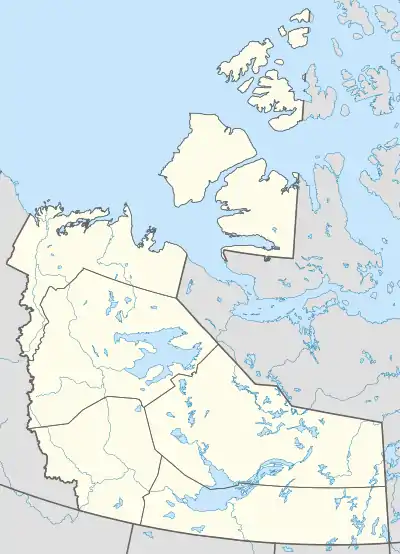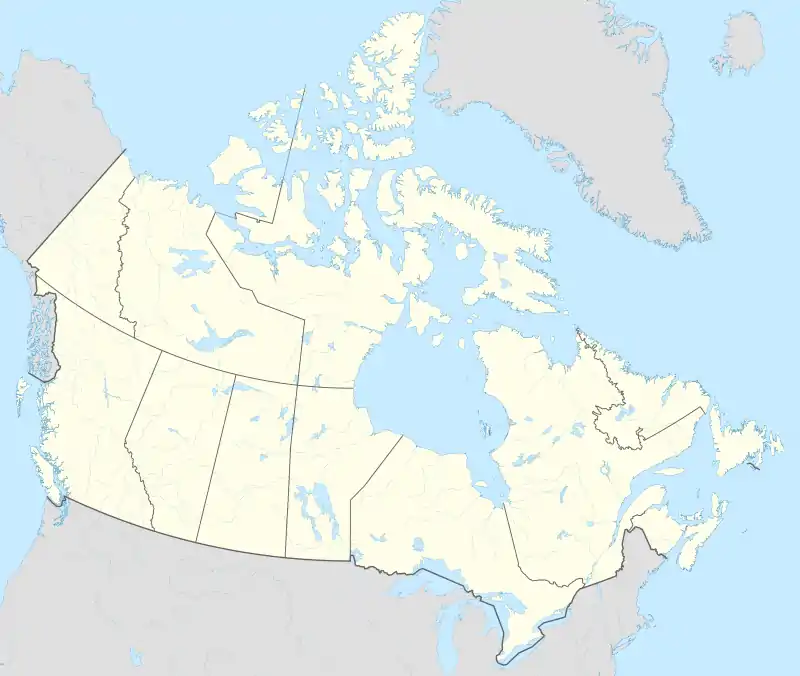Colville Lake, Northwest Territories
Colville Lake (K'áhbamį́túé meaning "ptarmigan net place") is a settlement corporation located in the Sahtu Region of the Northwest Territories, Canada. The community is located 50 km (31 mi) north of the Arctic Circle, on a lake of the same name, and is northeast of Norman Wells. This settlement is the administrative office of the Behdzi Ahda band government.
Colville Lake
K'áhbamį́túé | |
|---|---|
Settlement Corporation | |
.JPG.webp) | |
 Colville Lake  Colville Lake | |
| Coordinates: 67°02′18″N 126°05′32″W | |
| Country | Canada |
| Territory | Northwest Territories |
| Region | Sahtu |
| Settlement area | Sahtu |
| Constituency | Sahtu |
| First Nation (Designated Authority) | 30 November 1995 |
| Government | |
| • Chief | Wilbert Kochon |
| • Senior Administrative Officer | Joseph Kochon |
| • MLA | Norman Yakeleya |
| Area | |
| • Land | 128.39 km2 (49.57 sq mi) |
| Elevation | 259 m (850 ft) |
| Population (2016)[1] | |
| • Total | 129 |
| • Density | 1.0/km2 (3/sq mi) |
| Time zone | UTC−07:00 (MST) |
| • Summer (DST) | UTC−06:00 (MDT) |
| Canadian Postal code | X0E 1L0 |
| Area code(s) | 867 |
| Telephone exchange | 709 |
| - Living cost | 182.5A |
| - Food price index | 196.3B |
| Sources: Department of Municipal and Community Affairs,[2] Prince of Wales Northern Heritage Centre,[3] Canada Flight Supplement[4] ^A 2013 figure based on Edmonton = 100[5] ^B 2015 figure based on Yellowknife = 100[5] | |
Demographics
The settlement's population as of 2016 is 129, a 13.4% decrease from the last national census.[1] In 2017 the Government of the Northwest Territories reported that the population was 157 with an average yearly growth rate of 1.2% from 2006. The GNWT also reported that the majority, 148 people, were Indigenous, Sahtu Dene.[5] They are represented by the Behdzi Ahda' First Nation and belong to the Sahtu Dene Council[6]
|
| ||||||||||||||||||||||||||||||||||||||||||||||||||||||||||||||||||||||||
| Sources: NWT Bureau of Statistics (2001 - 2017)[7] | |||||||||||||||||||||||||||||||||||||||||||||||||||||||||||||||||||||||||
Geography and climate
Colville Lake is located 745 km (463 mi) by air, northwest of Yellowknife. The terrain is characterized by black spruce and tends to be small and sparse. Other vegetation includes mosses, lichens, grasses and alders.[8] The winter months begin in October and last until April. The month of May is considered the spring or breakup period. By the end of May or Early June the lakes and rivers are normally free of ice, although this varies. June, July and August are considered the summer months and temperatures range in the mid twenties. At times the temperature has climbed into the low thirties. By late September, freeze up is well underway again.[8]
History

The community of Colville Lake is the ancestral homeland of the Hareskin (Sahtu) Dene who still inhabit the area. The Hareskin Dene were never very numerous, with a population of less than one thousand people, living in six or seven bands, at the time of European contact. The Hareskins were a peaceful group, known for their use of small animals such as the Arctic hare. Located within the traditional homeland of the North Slave Dene tribe, Colville Lake is a completely traditional community in every sense. Although Father Émile Petitot brought Christianity to the area in 1864, organization of the community did not occur until 1962 when a Roman Catholic mission was established.[8]
Today
Today you can visit the site of the mission Our Lady of the Snows. One main attraction is a fishing lodge. Colville Lake is home to grayling, trout and pike fish. There is also a small art gallery and museum located next to the lodge. Rounding off the town, there is a bed and breakfast and two stores.[9]
References
- Canada, Government of Canada, Statistics. "Census Profile, 2016 Census - Colville Lake, Settlement [Census subdivision], Northwest Territories and Canada [Country]". www12.statcan.gc.ca. Retrieved 2017-09-06.
- "NWT Communities - Colville Lake". Government of the Northwest Territories: Department of Municipal and Community Affairs. Retrieved 2014-01-21.
- "Northwest Territories Official Community Names and Pronunciation Guide". Prince of Wales Northern Heritage Centre. Yellowknife: Education, Culture and Employment, Government of the Northwest Territories. Archived from the original on 2016-01-13. Retrieved 2016-01-13.
- Canada Flight Supplement. Effective 0901Z 16 July 2020 to 0901Z 10 September 2020.
- "Colville Lake - Statistical Profile (2006-2017)" (PDF). NWT Bureau of Statistics. Archived (PDF) from the original on 2018-08-29.
- Indian and Northern Affairs Canada Archived 2006-12-09 at Library and Archives Canada
- Population Estimates By Community from the GNWT
- Communities Economic Reference Library; Department of Industry, Tourism and Investment. pg 13.(2006).
- Spectacular NWT Tourism Archived 2009-01-24 at the Wayback Machine